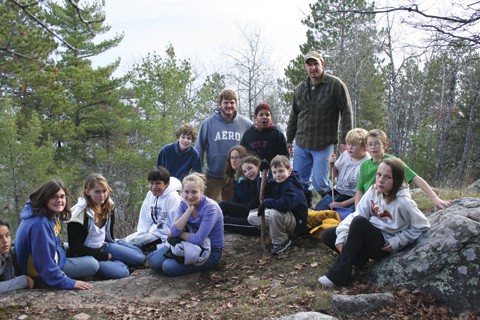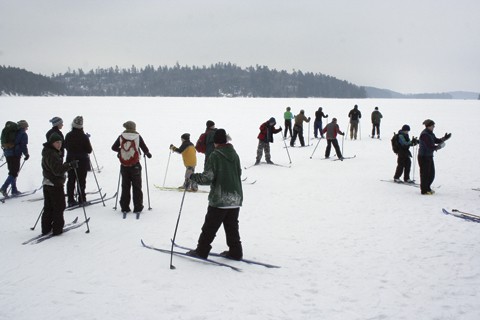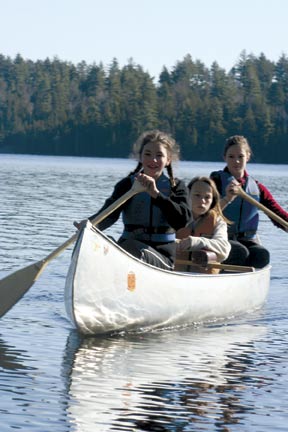Budding Program Reconnects Youth to Nature
Ice fishing, snow shoeing, canoeing and camping – cornerstones of the northwoods experience, yes, but cornerstones of drug and alcohol prevention? Project Venture North, a replica of Project Venture in New Mexico, is betting yes, serving American Indian communities in the Quetico Superior region by connecting kids with nature. The hope? That in addition to developing a renewed commitment to the land, their culture and their community, the junior high participants will be more likely to stay in school and a lot less likely to use drugs and alcohol.

Once every month Project Venture North students visit YMCA Camp Widjiwagan outside of Ely, Minnesota for a weekend of outdoor play and experiential education. Depending on the season, they learn to canoe, cross-country ski and perhaps most importantly, to simply enjoy being outdoors. Even though the fifth, sixth and seventh graders all live in or around the Quetico Superior Region, in towns like Tower, Orr and Net Lake, the “outdoors” are not something they’ve spent much time appreciating.

“They live in nature’s Disneyland and just don’t experience it.” Michelle Metzig is Indian Education Coordinator for St. Louis County Schools, and when her schedule allows, she likes to join the kids on their trips to Widjiwagan. She never tires of watching them learn to love the outdoors, transforming from skeptics suspicious of spending a whole day outside to kids who don’t want to go back inside. She loves the way they learn leadership and coping skills that can be hard to teach in the classroom; it’s the type of transformation she hoped Project Venture would create when she first pitched the idea of the program a few years ago. Now in its second year, Michelle is not the only one noticing that the outdoors can have big impacts. After accompanying a group of students to Widjiwagan, a Net Lake basketball coach was astounded by the experience. According to Michelle, “he couldn’t believe how his relationship changed with his students. He saw them in a totally new light, rising to the challenge of being outdoors and becoming leaders.” It was, he told her, one of the most amazing experiences he has had with his students.
Using the outdoors as a setting to teach life skills and transform student-teacher relationships is at the heart of the Project Venture curriculum. By creating lasting change, Project Venture coordinator Brian Ensign hopes students will feel more connected to their school. It’s a critical goal in a school district where students like his – mostly American Indian but also other ethnic minorities and low-income students – have not met with as much success as non-Indian students. American Indian students in particular are more likely to disengage from the school community and resort to drugs and alcohol. By giving the Project Venture students positive experiences, helping them express themselves, and facilitating stronger relationships with teachers and educators, Ensign hopes they will feel more comfortable, better understood, and as a result, stay in school and off drugs and alcohol.
“The great thing about the program is that we do that without ever talking about drugs or alcohol.” Instead, Ensign uses his unique role – part camp counselor, part teacher and part mentor – to provide positive experiences in four key areas: classroom teambuilding and writing activities; outdoor experiences like sledding, snowshoeing or geo-caching; adventure camps like Widjiwagan; and community and service learning projects. He also integrates American Indian practices and beliefs whenever possible, helping the students set out traditional offerings of tobacco at outdoor sites where meaninful experiences occur and inviting community elders to volunteer and speak to the students. It is not your traditional school curriculum, and that’s the point. By giving kids confidence in their own abilities and the ability to communicate, the program gives them the tools to cope and succeed in life. And as the program has grown, Ensign has seen marked changes in student enthusiasm and excitement when he arrives for an hourly classroom session, an after school activity or a trip to Widjiwagan.
The latter has so far been the most transformative part of the program, and last summer, a small group of students were even able take a canoe trip in the Boundary Waters Canoe Area Wilderness through Widjiwagan. The partnership has been made possible by financial support from the camp, which recognized Project Venture North as a natural fit for the camp’s mission to work with diverse groups and reach out to Northern and Iron Range students. YMCA program director Karen Pick has observed that, “after working with the kids for the past year and a half, it is clear that the kids who have participated more than once have gained confidence in their skills and in themselves.”
While it is still too early to tell if the program will have long-term impacts on drug and alcohol use, these observations have been echoed by Ensign and Metzig. They are hopeful that the visible changes in confidence and enthusiasm will translate to the same successes experienced by the original Project Venture in New Mexico. Developed by educator McClellen Hall to combat high drop out rates among Native American youth, Project Venture is the alcohol and substance abuse program of the National Indian Youth Leadership Project. It was specially designed to connect kids with native beliefs and a respect for mother earth, and twenty years of data and studies have shown that the approach works. In 2001, a study of “past 30-day” alcohol use showed that use declined among participants by 32%. A National Study of High Risk Youth found that “2 years after program enrollment, Project Venture participants had a 25% increase in past 30-day alcohol use, compared to a 64% increase seen in control group youth.” The program is so successful that the Substance Abuse & Mental Health Services Administration has recognized Project Venture as a model program. And in addition to St. Louis County, it is being recreated throughout the United States and Canada.

In time, Ensign and Metzig may have the data to support their belief that Project Venture North will change kids’ lives. It has been selected as one of six study sites to determine whether the replica programs are as successful as the original. For now, they will simply continue to develop the program. They hope that as the program becomes more integrated into the communities and more partners like Widjiwagan get involved, their ability to get kids outside, connect them to their culture and give them experiences in nature will only continue to grow.
All photos courtesy Project Venture North.
By Alissa Johnson, Wilderness News Contributor
This article appeared in Wilderness News Spring 2009

